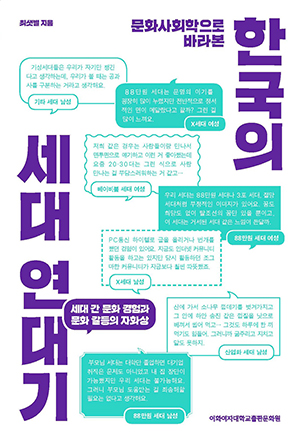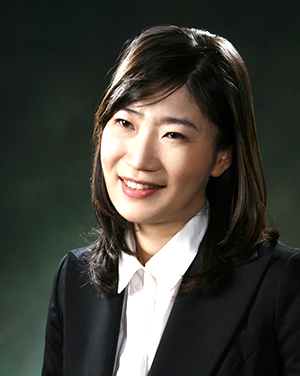본문
Korea's Generation Chronology - A Self-Portrait of Generational Experience and Cultural Conflict in the Perspective of Cultural Sociology

By Prof. SetByol Choi (choseta@ewha.ac.kr)
Department of Sociology
During the last half-century, Korea has undoubtedly experienced dramatic social changes. Neologisms that label people of different generations and cultures - heulksujeo, yolojok, gaejeossi, noinchung - reflect these changes. Results from dramatic social changes also explain heterogenous experiences that each generation had to encounter. Apparently, ‘generation’ has been a focal point of social conflict in Korean society, the gaping schism between older and younger generations. On this account, mass media and academia have poured out discussions on generational issues whenever social conflicts arise. However, problems of the coverage rely on exaggerating and reinforcing stereotypes and fixed images of each generation. In an attempt to blur the cut off divide between generations, this book < Generation Chronology – A Self-Portrait of Cultural Experience and Cultural Conflict among Generations in Korea > develops a further discussion of the intergenerational consciousness and the generational characteristics.
Linking cultural sociology and generation, this book explores the characteristics of generation theory and phenomenon. This book consists of two parts. Part I begins with examining the theoretical implications of the concept ‘generation’ in Korea. Presenting an overview of the discussions preceding research raises, this part also points out the problems they pose. Accordingly, this book further looks into the overall history of Korea’s generation research.
Then in part II, this book classifies generation boundaries by analyzing nationwide quantitative data on subjective generational consciousness and compare them with the general consciousness discussed in the earlier studies. Illustrating the life trajectory of each generation – 880,000-Won generation, X generation, baby-boom generation, and industrialization generation – this book draws generational characteristics that derive from these experiences. Remarkably rich interview data collected from each generation also adds clarity to the generational experience, consciousness and generational conflicts prompted in Korean society.
The Appendix lists the chronological order of political, economic and cultural events that gave rise to Korea's generation boundaries. Also, a chronological table on Korea's generation will provide a standard for further analysis of age effect, cohort effect and period effect.
The author draws generational characteristics from the everyday viewpoint and claims different generations make about the political, economic, socio-cultural arena. This book can be a useful resource for scholars and researchers who are interested in generations and related issues. It will also help general readers to enhance interest in social science research and guide them to understand their own and other generations comprehensively. This book will serve as a starting point and guideline to understand generational issues and conflicts in Korean society at a granular level and find practical resolutions.

* Related book
Korea's Generation Chronology - A Self-Portrait of Generational Experience and Cultural Conflict in the Perspective of Cultural Sociology, Setbyol Choi, Ewha Womans University Press, June 28, 320 pages.













